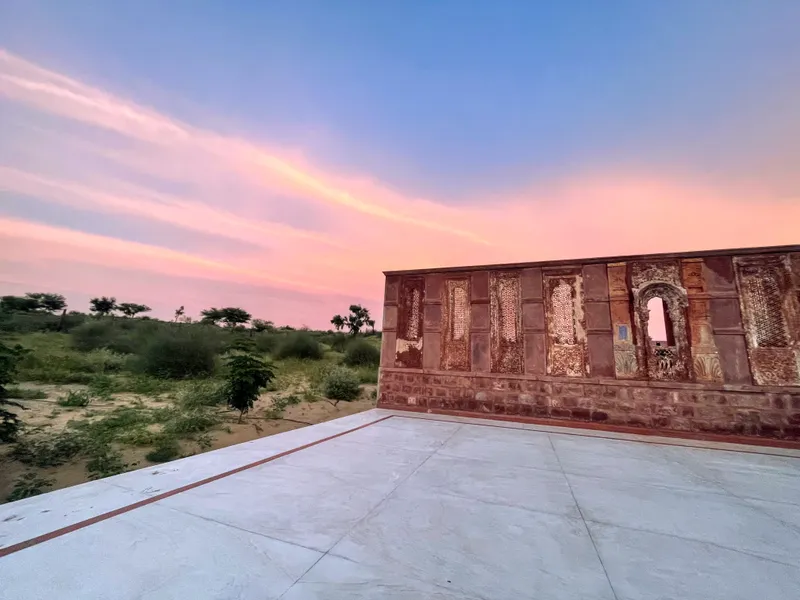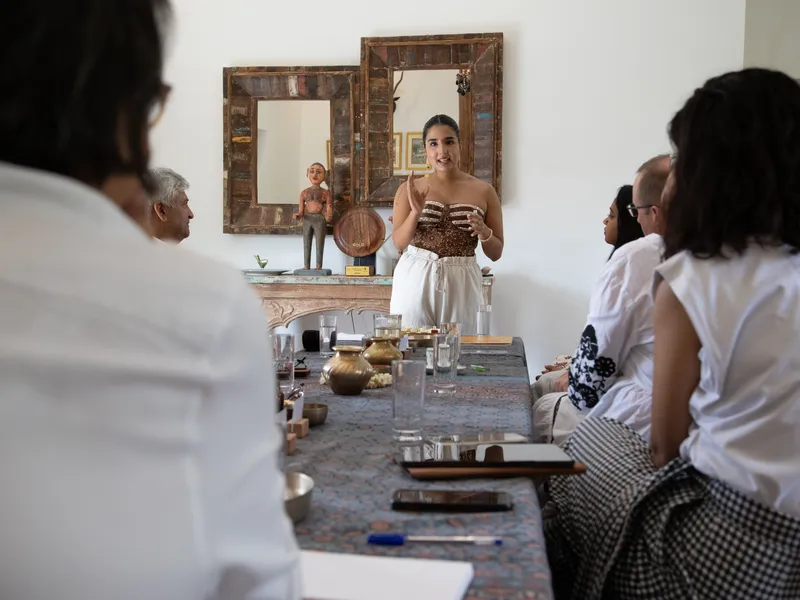A sensorial staycation in the middle of the Thar Desert
A scent-based wellness residency at Kaner Retreat, India’s first desert botanical resort, showcases the close connection between our sense of smell, emotion, and memory.
How often has a whiff taken you back to an old memory? Your mother cooking your favourite meal, a childhood trip to the beach, your first date with the first bona fide boyfriend, or the fabulous apple pie you sank your teeth into on a recent holiday.
Research reveals that the smells we experience play an important role in how we associate with memories and places. In fact, a study by the Sense of Smell Institute has shown that people can remember a scent with 65% accuracy after one year while visual memory drops to 50% after only a few months.
Sapna Bhatia’s love for the sights and smells of the Thar led her to open Kaner Retreat, India’s first desert botanical resort located on the Jodhpur-Jaisalmer highway. Bhatia recently teamed up with Esha Tiwari, scent storyteller and Founder of Kastoor, a homegrown brand of modern ittars, to start ‘Scents, Saawan, and Wellness’—a three-day sensorial staycation enveloped in plant-based wellness and held in the last week of August.
Tiwari believes that scents play a huge role in forming our emotional and mental landscape, and how we navigate the world through it. “A person could appreciate the most perfect scent and move on. But if you take them for a walk through a lane laden with flowers of their childhood, tuberoses or kaner, their scent beckoning them… it could bring them to tears,” she says.

At Kaner, enjoy a quiet stay, nature walks, safaris, and dinner under the stars in the desert.
Kaner derives its name from the Oleander flower, commonly known as the Desert Rose (kaner in the local language). It was opened in 2021 by Bhatia, who grew up in the Thar Desert, pursued a career in Delhi and London, and then yearned to return to her roots.
Located at the gateway to the desert, the luxurious eco-friendly resort offers well-appointed rooms, an outdoor swimming pool, a garden and terrace, and bespoke experiences. The staycation—a celebration of the desert monsoon—focused on explorations of scent memories, historical storytelling of Indian scents, and the genesis of the scent-based wellness ecosystem.
But why a scent-based wellness retreat during the monsoon? “The Thar desert comes alive during the monsoons. It is the time when the ephemerals come out and people celebrate Hariyali Teej. People have left the scorching summer behind, and the atmosphere is rich with petrichor and the fragrance of jasmine and wildflowers,” Bhatia says.
Nature seems to have set the stage for sensorial experiences that bring together “scent, saawan, and wellness”, she adds.
On the first day of the residency, we are offered a walk in the Oran, the sacred grove; and the wild gardens that surround the resort. Orans are an ancient system of conservation in the desert. Unwritten rules are the law here: people can forage, and local animals can graze, but no agricultural practices are allowed. The result, after thousands of years, is an unspoilt landscape rich in desert flora. The guide showcases the trajectory of desert botany in the cultural context of the desert, pointing out varied plants and visible fauna.
A long table, bedecked with fragrant rose petals and twinkling with the light of lanterns, beckons as the shadows lengthen. The backdrop offers the perfect setting for the Saawan Thali, rich with the best of seasonal produce from the desert. The beautiful moonlight and redolent breeze invite one to linger long after dinner is done.
The next day, the first thing on the agenda is a perfume blending session. An array of essential oils and carriers invite people to mix, match, and make their own blends. Participants wait for the oil of their choosing, and use glass droppers expertly. There’s much sniffing and smelling, inhaling, and exhaling, and oohing and aahing as the attributes of rose, jasmine, and sandalwood are discussed!

Esha Tiwari, founder of Kastoor, leads a perfume blending session at a scent-based wellness retreat at Kaner.
Perfume blending is hard work and everyone’s more than ready for the planned five-course meal, one that’s like no other as each course is paired with a scent.
“This meal experience is rooted in the culinary culture of the Thar desert as it uses local ingredients. To enhance the fragrance aspect, we made use of edible scented ingredients like camphor and sandalwood,” Bhatia says.
The courses keep coming—first guava, sweet lime, mint appetiser with mango chutney, and jasmine flowers; then a quinoa salad tossed in rose and lime-infused olive oil from the Thar Desert with goat’s cheese; kofta made with desert-foraged greens and camel cheese paired with karonda and sandalwood chutney; and edible camphor-infused millet flatbread with garlic chutney, camel cheese, and wild desert capers.
The meal ends on a sweet note with Biranj, sweet saffron rice with cloves, Marwari kulfi quenelle, and wild Acacia Senegal flowers.
Everyone’s unanimous that the meal is a treat for the eyes, stomach, and nose! For the next couple of days, a range of events keep us busy: historical storytelling of Indian scents and the genesis of the scent-based wellness ecosystem, scent rituals, a session on how to make scents a daily part of your life to elevate well-being, and a poetic reading of historical scented love letters.

Dinner in the desert, under the moonlight and on a table strewn liberally with rose petals, is a memorable experience.
As the fragrance of rose petals wafts through the air during dinner on the dunes, it seems more than apparent that of our five senses, only one is uniquely linked to memory and emotion.
Why else did French novelist and essayist Marcel Proust outline the “Proustian memory,” an involuntary memory triggered to the surface of the psyche by a sensory experience like smell? In his À la recherche du temps perdu, the protagonist vividly remembers a childhood moment triggered by the taste of a French Madeleine cake soaked in tea.
Neuroscientists have found that a close physical connection between "the regions of the brain linked to memory, emotion, and our sense of smell may explain why our brain learns to associate smells with certain emotional memories".
Apart from nurturing emotional memories, fragrance may augment brain function as it is positively associated with self-image, memory, and nostalgia. In a study titled The Proust effect: Scents, food, and nostalgia, the authors write that scent-evoked and food-evoked nostalgia confer "numerous psychological benefits, including enhanced self-esteem, feelings of social connectedness, and deeper meaning in life".
Tiwari stresses the importance of focusing on the emotional aspects of scents and their role in wellbeing. Her scent-based memory mapping encourages participants to “not be intellectual about what you are sniffing, but rather be intuitional and emotional”. The idea is to allow a picture to form in the mind, and see where it takes you, eyes closed and focus narrowed.
Another day, during a guided scent meditation, she encourages participants to “grow a mental garden with the help of scents, a safe space that you could visit any time, whenever the world gets too chaotic”. The characters and the personality of the scents and flowers can be channelised to improve the quality of life, she says.
There’s more to do in and around Kaner apart from exploring scents. The Nagnechi Mata Mandir Dera is within walking distance, and botanical walks, jeep safaris, dune drives, and horse rides can be easily arranged.
Jodhpur, India’s blue city, is about 95 km away and makes for a great day(s) out. The imposing Mehrangarh fort stands guard loftily over the many palaces, temples, havelis, and distinctive blue houses. Local lore suggests that mixing indigo into the limestone has helped repel sunlight and UV rays and kept the interiors cool for centuries. A walk around the old city reveals the plentiful souvenir options: glass bangles, cutlery, dyed cloth, lacquer work, felt and leather products, carpets, and marble artefacts.

The luxurious eco-friendly resort offers a range of bespoke experiences.
As dusk falls and the twinkling lights come on at Kaner, the botanical resort seems to showcase the resilience and courage of the people and plants of the desert.
“We aim to showcase life in the desert, under the scorching sun and soothing stars, through plant-based cuisine and unique experiences. The scent-based wellness retreat was one of them and we’ve already received requests for an encore,” Bhatia says.
No surprises there for as Helen Keller famously said, “Smell is a potent wizard that transports you across thousands of miles and all the years you have lived.” A sensorial staycation then seems like an escape within a vacation! Who would say no to that?
Edited by Megha Reddy







